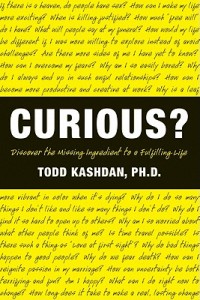While reviewing a recent blog entry by Daniel Pink, I stumbled across the work of Dr. Todd Kashdan, a professor at George Mason University. Dr. Kashdan is the Director of the Laboratory for the Study of Social Anxiety, Character Strengths, and Related Phenomena.
I know that’s kind of a mouthful (how would you like to introduce yourself at a party with this as your job title?), so here is some more detail on what his group actually does:
"The Laboratory for the Study of Social Anxiety, Character Strengths, and Related Phenomena is committed to conducting basic research to better understand the nature of social anxiety and positive psychological processes (e.g., curiosity, gratitude, mindfulness, savoring, purposeful living) and applying this knowledge to better people's lives…. We are focused on discovering, applying, and sharing psychological knowledge to better understand components of human functioning, improve the treatment of psychological problems, enhance well-being and character strengths, and promote this work at the individual and societal level."
Isn’t this a great purpose statement for Dr. Kashdan’s work? He seems to be working (from a research perspective) on the issues that many of us would consider critical for developing thriving relationships and experiencing a consistent sense of well-being.
I look forward to exploring more of his published work, but I thought I’d give you a little taste of what I’ve already discovered. One of the topics he tends to focus on is the “positive psychological process” of curiosity. Here is a summary of Daniel Pink's recent interview with Dr. Kashdan regarding the topic of curiosity:
1. Thrive on uncertainty. We rarely look forward to the tension that accompanies uncertainty, but research shows that these feelings lead to the most intense and longest-lasting positive experiences. New and uncertain activities make people happier and create more meaning than familiar routines. Re-train your brain to benefit from the pleasures of surprise and uncertainty. And do the same for people around you. For instance, every week, give a free lunch away to someone who best embodies a strength valued by the business (Compassion? Leadership? Gratitude? Humor?). Let the person who wins pick a lunchmate whom they don’t know as well as they should. Use the pleasures of uncertainty to build satisfaction and commitment inside your organization.
2. Find the unfamiliar in the familiar. As soon as we think we’re experts, we stop paying attention and start falling back on scripts, labels, and categories. That’s especially true in the workplace. Yet scientists have discovered the value of attending to what we don’t know about people and how they differ from us — instead of relying on what we already know and how they are similar to us. Encourage your team to make this mindset switch. You’ll develop stronger bonds, squelch prejudice, and help your star players avoid being blinded by their expertise. For instance, when you go out to lunch with colleagues, ask them about something that interests you but that you never talk about. What are their top 5 places to travel to in the world, and why? What movies do they like but are often embarrassed to share? And don’t always spend your time with people you know. Seek out strangers at work who intrigue you, who are different from you, and who expand your horizons.
3. Be a safe haven for the risks and joys of others. To take risks and experiment with new ways of thinking and acting, we need to feel secure. If you want workers to be creative, be responsive when they share past explorations or future plans. If they feel uncomfortable, let them know that anxiety is natural when trying new things. Share a story about the last time you felt anxiety and self-doubt. You might be surprised how comfortable it will make them to take on tough challenges. And respond genuinely when they share what is intriguing and going right in their lives. Don’t just ask, “How was your weekend?” Ask them what their peak moments were on Saturday and Sunday. And when they share, follow-up with questions, ask for details. You might become genuinely interested in their interests and create a safe haven for the sorts of breakthrough thinking that changes companies — and sometimes the world.
If you’d like to learn more about this topic (or, maybe now you’re just curious...), you may want to pick up Dr. Kashdan’s book: Curious?: Discover the Missing Ingredient to a Fulfilling Life.
Editor's Note: This article was written by Ben Hess. Ben is the Founding Partner and Managing Director of Tidemark, Inc. and a regular contributor to WorkPuzzle. Comments or questions are welcome. If you're an email subscriber, reply to this WorkPuzzle email. If you read the blog directly from the web, you can click the "comments" link below.




Comments